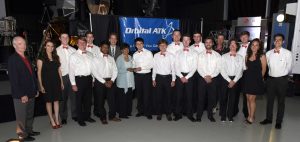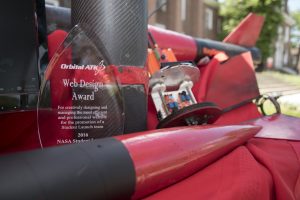
The University of Louisville’s rocket team, River City Rocketry, proved that they have the “right stuff,” placing a strong second at the 2016 NASA Student Launch challenge held at NASA’s Marshall Space Flight Center near Huntsville, Alabama, in April. It’s the fourth year in a row that the team, comprised of students from UofL’s Speed School of engineering, have finished in the top three at the national competition.

“It was definitely a challenge because every year there are a lot of great teams from top-ranked engineering schools that show up, so placing second is quite an accomplishment,” team co-captain Emily Robison said. “The team did really well, winning the website and safety award in addition to finishing second, so a lot really goes into it and you need a well-rounded team to pull off something like that.”
UofL’s rocket entry was made entirely from scratch, right down to its fiberglass tube casing. But what’s even more impressive is that the Speed School does not offer an aeronautics-specific major, meaning that River City Rocketry placed higher than several teams comprised of future aeronautics engineers.
 “All kinds of engineering students – electrical, mechanical and computer engineering students – came together to volunteer their time,” Speed School acting dean John Usher said. “This is not a part of a course and they get no academic credit for the project. They participated because they are passionate about it. It allowed them to take the things they learn in the classroom, pick up a screwdriver and apply those concepts with some goal in mind.”
“All kinds of engineering students – electrical, mechanical and computer engineering students – came together to volunteer their time,” Speed School acting dean John Usher said. “This is not a part of a course and they get no academic credit for the project. They participated because they are passionate about it. It allowed them to take the things they learn in the classroom, pick up a screwdriver and apply those concepts with some goal in mind.”
The purpose of the competition was to help NASA develop the capabilities needed to send humans to an asteroid by 2025 and Mars in the 2030s. For students, the idea of being a part of a project that will hopefully send a human to the Red Planet is awe-inspiring.
“The way the competition is structured to provide NASA with new ideas, and with a bunch of new students working on the team, they provided a fresh perspective which breeds innovation,” Robison said. “It’s really neat to see how something that we can do at this level can be used for something greater.”
“The frontier now is no longer on terra firma, it’s up there,” said Dr. Clinton Kelly III, a member of the Speed School Industrial Board of Advisors. “Anything we can do that encourages kids to open up the new frontier is worth doing. These students are a part of the next generation that are going to be able to get us into orbit at low cost, and once you can do that you’re halfway to everywhere.”
Check out video from the competition below:


































